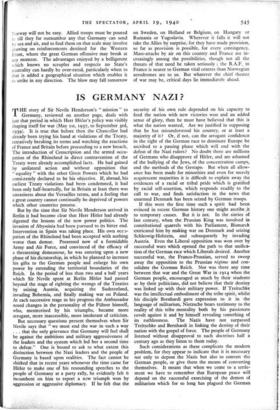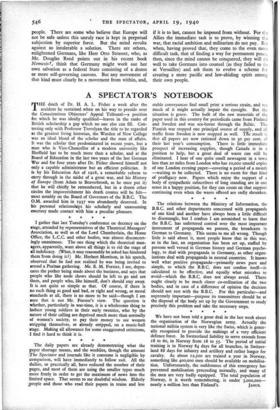IS GERMANY NAZI ?
THE story of Sir Nevile Henderson's " mission " to Germany, reviewed on another page, deals with just that period in which Herr Hitler's policy was visibly shaping itself for war (May 1st, 1937, to September 3rd, 1939). It is true that before then the Chancellor had already been trying his hand at violations of the Treaty, tentatively breaking its terms and watching the reactions of France and Britain before proceeding to a new breach. The introduction of Conscription and the armed occu- pation of the Rhineland in direct contravention of the Treaty were already accomplished facts. He had gained by unilateral action and without opposition that " equality " with the other Great Powers which he had consistently declared to be his objective. If, abroad, his earliest Treaty violations had been condemned, it had been only half-heartedly, for in Britain at least there was uneasiness about the Versailles terms, and a feeling that a great country cannot continually be deprived of powers which other countries possess.
But by the time that Sir Nevile Henderson arrived in Berlin it had become clear that Herr Hitler had already digested the lessons of the new power politics. The invasion of Abyssinia had been pursued to its bitter end. Intervention in Spain was taking place. His own occl- pation of the Rhineland had been accepted with nothing worse than demur. Possessed now of a formidable Army and Air Force, and convinced of the efficacy of a threatening demeanour, he was entering upon a new phase of his dictatorship, in which he planned to increase his gifts to the German people and enlarge his own power by extending the territorial boundaries of the Reich. In the period of less than two and a half years which Sir Nevile spent at Berlin Hitler had passed beyond the stage of righting the wrongs of the Treaties by seizing Austria, acquiring the Sudetenland, invading Bohemia, and finally making war on Poland. At each successive stage in his progress the Ambassador noted changes in the personality of the Fiihrer himself, who, mesmerised by his triumphs, became more arrogant, more inaccessible, more intolerant of criticism.
But necessary questions present themselves when Sir Nevile says that " we must end the war in such a way . . . that the only grievance that Germany will feel shall be against the ambitions and military aggressiveness of the leaders and the system which led her a second time to defeat." One is bound to ask to what extent this distinction between the Nazi leaders and the people of Germany is based upon realities. The fact cannot be shirked that in recent years whenever the time came for Hitler to make one of his resounding speeches to the people of Germany at a party rally, he evidently felt it incumbent on him to report a new triumph won by aggression or aggressive diplomacy. If he felt that the security of his own rule depended on his capacity to feed the nation with new victories won and an added sense of glory, then he must have believed that this is what the nation wanted. Are we justified in supposing that he has misunderstood his country, or at least a majority of it? Or, if not, can the arrogant confidence in the right of the German race to dominate Europe be ascribed to a passing phase which will end with the defeat of the Nazi rulers? No doubt there are millions of Germans who disapprove of Hitler, and are ashamed of the bullying of the Jews, of the concentration camps, and the methods of the Gestapo. But when all allow- ance has been made for minorities and even for merely acquiescent majorities it is difficult to explain away the evidences of a racial or tribal pride which is gratified by racial self-assertion, which responds readily to the call to war, and finds satisfaction in the news that unarmed Denmark has been seized by German troops.
If this were the first time such a spirit had been evinced in recent German history one might ascribe it to temporary causes. But it is not. In the sixties of last century, when the Prussian King was involved in constitutional quarrels with his Parliament, Bismarck extricated him by making war on Denmark and seizing Schleswig-Holstein, and subsequently by invading Austria. Even the Liberal opposition was won over by successful wars which opened the path to that unifica- tion of the German race which Liberals desired. Another successful war, the Franco-Prussian, served to sweep away the opposition to the Prussian regime and con- solidate the German Reich. Nor was there any time between that war and the Great War in 1914 when the German people, encouraged as much by their students as by their politicians, did not believe that their destiny was linked up with their military power. If Treitschke was the intellectual embodiment of the tribe spirit, whilst his disciple Bernhardi gave expression to it in the language of militarism, Nietzsche bears testimony to the reality of this tribe mentality both by his passionate revolt against it and by himself revealing something of its ruthlessness. The Nazis have not surpassed Treitschke and Bernhardi in linking the destiny of their nation with the gospel of force. The people of Germany listened without disapproval to such doctrines half a century ago as they listen to them today.
Such considerations as these complicate the modern problem, for they appear to indicate that it is necessary not only to depose the Nazis but also to convert the German people, or give them the means of converting themselves. It means that when we come to a settle- ment we have to remember that European peace will depend on the successful exorcising of the demon of militarism which for so long has plagued the German people. There are some who believe that Europe will not be safe unless this unruly race is kept in perpetual subjection by superior force. But the mind revolts against so intolerable a solution. There are others, enlightened Germans, like Herr Otto Strasser, who, as Mr. Douglas Reed points out in his recent book Nemesis?, think that Germany might work out her own salvation as a federal State consisting of a dozen or more self-governing cantons. But any movement of that kind must clearly be a movement from within, and, if it is to last, cannot be imposed from without. For ti Allies the immediate task is to prove, by winning ti war, that racial ambition and militarism do not pay. B_ :t when, having proved that, they come to the even mot difficult task, that of finding a way for permanent peace, then, since the mind cannot be conquered, they will d well to take Germans into counsel (as they failed to (') at Versailles) and ask them to evolve a scheme L r creating a more pacific and law-abiding spirit among their own people.











































 Previous page
Previous page